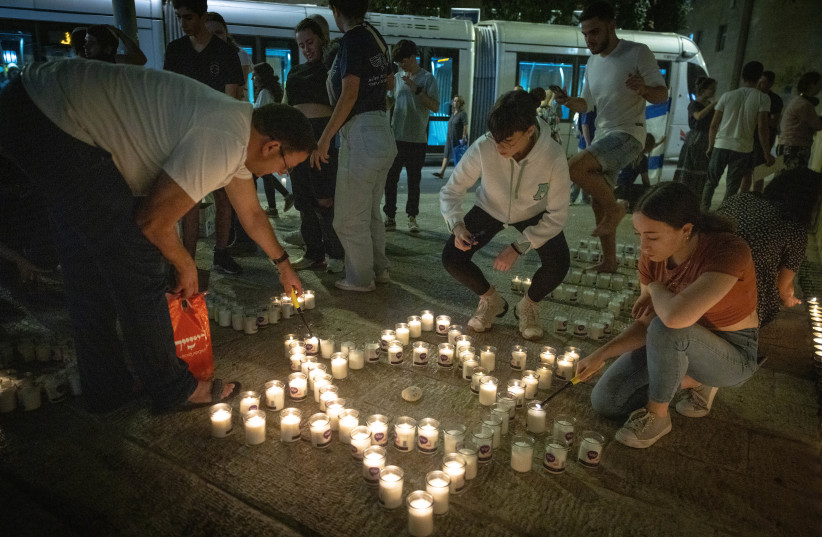The past year has been extremely challenging, and it was also a year during which we were reintroduced to the kindness and generosity surrounding us.
In the aftermath of October 7, everyone mobilized: hundreds of thousands of reserve soldiers reported to their bases, many of them not even waiting for official orders; across Israel everyone sprang into action with numerous volunteers making incredible efforts to provide food, clothing and shelter to Israelis evacuated from their homes; and around the world, Jews and non-Jews contributed – writing letters of support, fundraising or demonstrating in the streets.
Compare these acts of kindness to a lot of the content we consume over social media, which can be toxic, as proven by the countless vicious comments or nasty tweets posted by people around the world every day. Sometimes I take long breaks, even entire days, during which I stay away from social platforms simply because I know how nasty people can become when hiding behind their screen and keyboard.
None of us are surprised when we’re scrolling on Facebook, X or Instagram and then see a picture or video calling out someone for speaking disrespectfully to a flight attendant or driving a dirt bike through fields waiting to be harvested. In fact, it’s such a common practice that we have a word for this kind of posting: shaming.
It doesn’t have to be like this; social media could be where we discover all the good things people have to offer. What we are exposed to is determined by the people around us. Changing the sentiment to which we are exposed is largely up to us.


Compare the act of shaming to the kindness we are witnessing during the ongoing war, with people going out of their way to help complete strangers.
Hanoch Daum, an Israeli comedian and writer, has been operating a help center to assist displaced Israelis, reserve soldiers and their families. He and his team do incredible work, and he recently wrote something we should all pay attention to. Daum said there are many people they approach in their efforts to help who say “no.”
But Daum and his team made a strategic choice: no calling them out; no shaming. Instead, they share the names and stories of the people who went out of their way and helped. The phrase he used was ‘faming’ – the direct opposite of shaming.
FAMING, in essence, is putting the spotlight on the people who go the extra mile to help others. While Daum wrote this in relation to his efforts during the war, it should be a much broader lesson for us all. Such a mindset can really change the way we view the world. Imagine if our social feeds were filled with stories about the pizza store owner who provided a free dinner to someone who couldn’t afford it, or the car mechanic who saw that the car trouble was so minor he fixed it without charge.
A recent post on Facebook went viral after someone asked for help finding a cheap car he could use as a home due to financial troubles. The virality wasn’t caused by his request but by the hundreds of replies offering assistance to a complete stranger. Some offered to cover the costs, others were willing to rent out rooms within this person’s budget, and many people were willing to donate their time, money, or household items to help him in his time of need.
Solidarity over strife
In Israel, the year leading up to October 7 was brutal, with social rifts and political arguments escalating to acts of violence and feelings of hatred. The first months of the war were the complete opposite – Israeli solidarity was once again at its best. Now we all face a choice: what discourse would we rather be part of? What society do we want our children to grow up in?
My answer is clear. I want my children to hear about people who help others. I want them to see the many acts of kindness carried out around us every day. Obviously, educating them to be nice, generous and polite is my job as a parent. But for us to actually change society, we all need to step up to the plate and make a conscious decision to change what our “social feed” looks like.
Rosh Hashanah is just around the corner. Most of the content around this year’s High Holy Days will revolve around us as a collective, commemorating the unbelievable one-year mark of the war, with over 100 people still in Gaza and tens of thousands of Israelis not yet back in their homes. As individuals, however, we must look at our own actions and try to improve where possible.
This year, let’s use the power of our social feeds to recognize and reward those who deserve it, rather than amplifying stories of wrongdoings. If we stop shaming and start faming, we can create a better society for us and our children.
The writer is chief of staff at Lightricks, a Jerusalem-based company that develops video and image editing apps and software.
